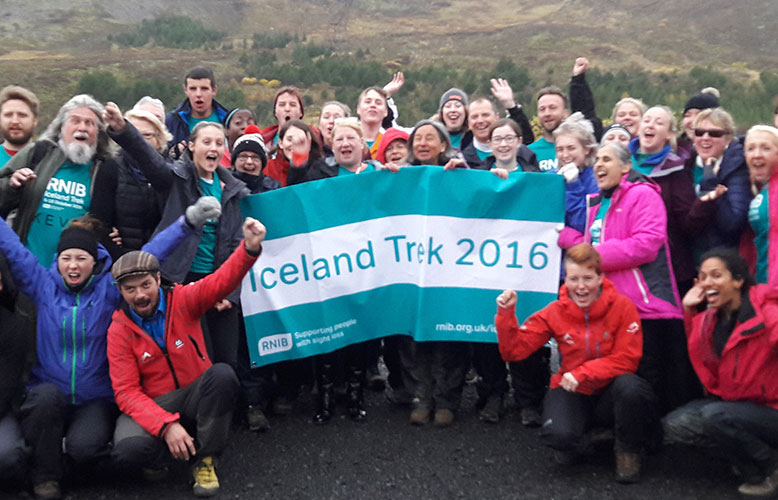My vision
Born into blindness
Chair of the Royal National Institute of Blind People, Kevin Carey, discusses his experiences of living with sight loss

26 February 2017
I was born nine weeks premature and was diagnosed with retinopathy of prematurity. While I had no vision in my right eye, I had a little in my left.
I retained residual vision in my left eye until my mid-20s. However, people believed that it wasn’t very much back when I was growing up in the 1950s and there was a theory during this time that people who had limited vision damaged their eyes further by using them.
As a result, from the age of three I was taught to read braille. However, I still taught myself how to read print, which I read into my 20s until my remaining vision packed up – not because of the over-use of the eye, but because it was attacked by acute glaucoma, which was always going to be a possibility.
Growing up in darkness
Due to my visual impairment, I was educated in a school until the age of 11 with a whole load of children with the same condition as me – it was like having limited or no vision was ‘normal.’ Because of this, when I returned home from my boarding school during the school holidays, I found it very difficult as I didn’t know anyone in the town and I was suddenly considered ‘different.’ It was difficult because, although I could see a small amount, partially sighted people generally, still to this day, have a hard time. They are often doubted as people don’t understand how they can read a Kindle, for example, but can’t see the bus stop.
I entered mainstream education around the age of 12 when I attended a ‘normal’ secondary school full of children with normal vision. Being in this environment made me learn about the seeing world and, while I knew that I would never have as much vision as them, I knew what they did with it – they could see from one end of a football pitch to another, play cricket and hit a fast-moving ball. However, I soon learned that I could do things that they couldn’t too.
"What I still find hard today about losing my sight is the fact that as time passes by, I know less and less about what things look like...I can't picture the world that I live in today. And the older I get, the less I can picture it, which is difficult"
The last sight lost
I was first diagnosed with acute glaucoma in my late teens, which threatened to take the little vision I had. Consequently, I taught myself independent mobility by navigating my way around while blindfolded. At the same time, around the age of 18, I taught myself how to use a white cane. My thinking behind this was that I should teach myself while I still had some vision in case I ever lost it all.
Unfortunately, in my mid-20s this became a reality, as a result of the acute glaucoma. Thanks to this advanced learning, when I left Moorfields Eye Hospital after having my left eye enucleated, I could travel home on the underground using a white cane.
I admit that the complete loss of my sight wasn’t a terrible surprise, but it doesn’t mean that it wasn’t horrible.
Job difficulties
I found losing what little sight I did have difficult, not least because my contract job coincidentally came to an end the same week I lost my sight. Suddenly, I was not only sightless, but I was jobless too.
I feel that it has always been desperately hard for blind people – no matter how well qualified they are – to get into work, and this is still an issue today.
Personally, I am a University of Cambridge graduate, who also won a scholarship to Harvard. As an undergraduate, I was president of The Cambridge Union, which was kind of the most important thing you could do at Cambridge at the time. I was also editor of its newspaper, Varsity, and, as far as I know, I was the only person then to have held both of those roles. Yet, when I lost my job in the same week I lost my sight, it was still really hard for me to get back into work.
Ultimately, all of the university educated blind people that I know, including me, are either in academic disciplines or run a self-employed portfolio. Very few blind people, however skilled they are, are in full-time commercial jobs.
For me, I have a portfolio. I am chair of the RNIB, which takes up half of my week, I am an IT consultant, I write books, and I am a part-time minister for the Church of England.

Invisible world
What I still find hard today about losing my sight is the fact that as time passes by, I know less and less about what things look like. While I can still picture the 1960s, the face of Prime Minister Harold Wilson and the cover of The Beatles’ Sgt Pepper’s Lonely Hearts, I don’t know what anyone looks like today. I can’t picture the world that I live in. And the older I get, the less I can do this.
Kevin Carey took part in the RNIB’s first fundraising trek in Iceland in October. The charity is hosting a second trek on 21–25 September 2017. For more information and to sign up, visit the website.
Advertisement


Comments (0)
You must be logged in to join the discussion. Log in